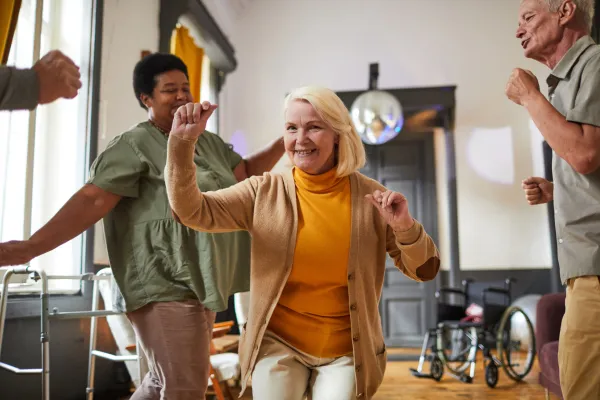
Health and Wellness for Seniors - Guide to Aging Well
As our loved ones age, ensuring their health and well-being becomes increasingly important. Health and wellness in seniors encompass physical mobility, mental health, and nutrition. These elements are essential to maintaining a high quality of life and independence. This blog explores how to promote physical health and mobility, recognize and address senior depression, and provide nutrition tips tailored to the needs of elderly loved ones.
Promoting Physical Health and Mobility in Seniors
The Importance of Staying Active
Physical health is a cornerstone of overall well-being, especially for seniors. Regular physical activity helps maintain muscle strength, flexibility, and balance, reducing the risk of falls—a leading cause of injury among the elderly. Exercise also plays a significant role in managing chronic conditions such as arthritis, heart disease, and diabetes. Beyond physical benefits, staying active can boost mood, improve sleep, and increase energy levels.
Types of Exercise for Seniors
There are various types of exercises that can benefit seniors, each tailored to different fitness levels and mobility. Cardiovascular exercises, such as walking, swimming, or cycling, help maintain heart health and stamina. Strength training exercises, using light weights or resistance bands, can help build muscle mass, which naturally declines with age. Flexibility exercises, including yoga or stretching routines, keep joints supple and reduce the risk of injury. Balance exercises, such as tai chi, can prevent falls and improve coordination.

Incorporating Physical Activity into Daily Routine
Integrating physical activity into a senior's daily routine can be simple and enjoyable. Activities like gardening, dancing, or even taking a leisurely stroll around the neighborhood can provide valuable movement and exercise. Encouraging participation in group fitness classes designed for seniors can also foster social interaction and make exercise more engaging. For those with limited mobility, chair exercises or water aerobics offer safe alternatives that still provide significant health benefits. It’s essential to consult with healthcare providers to tailor an exercise plan that meets individual needs and limitations.
Using Mobility Aids
For some seniors, mobility aids such as walkers, canes, or scooters are essential tools for maintaining independence. These aids can significantly reduce the risk of falls and provide a sense of security when moving around. Proper fitting and training on the use of these devices are crucial to maximize their effectiveness and prevent potential misuse. Regular assessments by healthcare professionals can help ensure that mobility aids continue to meet the changing needs of the user.
Mental Health: Recognizing and Addressing Senior Depression
Understanding Senior Depression
Mental health is a critical, yet often overlooked, aspect of senior well-being. Depression in seniors can be triggered by various factors, including the loss of a spouse or friends, chronic illness, or a lack of purpose after retirement. Unlike typical sadness, depression is a persistent condition that can significantly impact a senior’s ability to enjoy life. Symptoms may include feelings of hopelessness, irritability, changes in sleep patterns, and withdrawal from social activities. It’s important to note that these symptoms are not just a normal part of aging and should be addressed seriously.
The Impact of Isolation and Loneliness
Isolation and loneliness are significant risk factors for depression in seniors. As mobility declines or as friends and family members pass away, elderly individuals may find themselves spending more time alone. This isolation can lead to feelings of abandonment and despair. Staying connected with loved ones through regular visits, phone calls, or video chats can help alleviate these feelings. Additionally, involving seniors in community activities or volunteer opportunities can provide them with a sense of purpose and belonging.

Encouraging Social Interaction
Social interaction is vital for maintaining mental health in seniors. Engaging in community activities, joining clubs, or participating in group exercises can help seniors build connections and reduce feelings of loneliness. Encouraging participation in activities that they enjoy, whether it’s a book club, gardening group, or dance class, can provide both social and emotional benefits. For those unable to leave the home, online communities and virtual meetups can offer valuable interaction and support.
Seeking Professional Help
If a senior shows signs of depression, it’s crucial to seek professional help. Mental health professionals, such as therapists or counselors, can provide the necessary support and treatment. Therapy can help seniors work through feelings of loss, anxiety, or hopelessness, and offer strategies for coping with life’s changes. In some cases, medication may be prescribed to manage symptoms of depression. Additionally, holistic approaches such as art therapy, music therapy, or even pet therapy have been shown to provide emotional comfort and improve cognitive function in seniors.
Nutrition Tips for Elderly Loved Ones
Adapting to Changing Nutritional Needs
As people age, their bodies undergo changes that affect nutritional needs. Seniors often require fewer calories due to decreased activity levels but need more of certain nutrients, such as calcium for bone health, vitamin D for immune function, and fiber for digestive health. Additionally, age-related changes in metabolism, appetite, and digestive efficiency can make it more challenging for seniors to get the nutrients they need. Understanding these changes and adapting diets accordingly is crucial for maintaining health and preventing chronic diseases.
Incorporating Nutrient-Dense Foods
To meet the nutritional needs of seniors, focus on nutrient-dense foods that provide essential vitamins and minerals without excess calories. Leafy greens, such as spinach and kale, are rich in vitamins A, C, and K, while also providing fiber. Whole grains like oats and brown rice offer sustained energy and are good sources of B vitamins and minerals like magnesium. Lean proteins, including chicken, fish, and legumes, help maintain muscle mass and repair tissues. Dairy products or fortified plant-based alternatives provide calcium and vitamin D, which are critical for bone health. Omega-3 fatty acids, found in fatty fish like salmon, walnuts, and flaxseeds, support brain health and reduce inflammation.
Addressing Common Dietary Challenges
Seniors may face several dietary challenges, including difficulty chewing or swallowing, decreased appetite, or dietary restrictions due to medical conditions. It’s important to address these challenges by offering soft or easy-to-chew foods, smaller and more frequent meals, and flavoring food with herbs and spices instead of salt to enhance taste. Ensuring that meals are visually appealing and served in a pleasant dining environment can also help stimulate appetite.
Making Mealtimes Enjoyable
Mealtimes are not just about nutrition; they’re also an opportunity for social interaction and enjoyment. Encourage seniors to eat with family or friends whenever possible, as this can make meals more enjoyable and reduce feelings of isolation. If a senior struggles with meal preparation, consider meal delivery services that cater to their dietary needs. Additionally, involving seniors in meal planning and preparation, even in small ways, can give them a sense of control and engagement in their own health.

Conclusion
Health and wellness in seniors involve a holistic approach that includes physical activity, mental health support, and proper nutrition. By focusing on these key areas, we can help our elderly loved ones maintain their independence, happiness, and overall well-being.
If you’re seeking guidance or support in caring for an elderly family member, contact Your Elder Care Specialist today. Our team is dedicated to providing expert advice, resources, and compassionate care to help your loved ones live their best lives.


